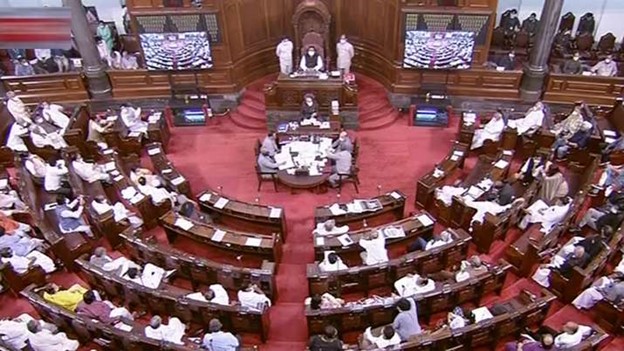There is a fundamental difference between the two Houses of the Indian Parliament- the members of the Lok Sabha, directly elected by the people of the country and the members of the Rajya Sabha, indirectly elected by the state legislatures. So, you would think that the members of the Lok Sabha would perhaps be a bit more arrogant or at least assertive about their status. But it works the other way round, as it was visible recently.
On Tuesday, the Rajya Sabha, colloquially referred to as the Upper House, witnessed some high-voltage drama. During an unprecedented ruckus in the Rajya Sabha during a discussion on the farmers’ issue, at least two members of the House climbed the reporters’ table- one of them waved a black cloth, and the other threw a file at the chair of the House after the proceedings were adjourned. Meanwhile, around half a dozen MPs sat at the tables.
The opposition lawmakers sat on the reporters’ table for near 100 minutes, as the House witnessed multiple adjournments between 2:16 PM and 4:01 PM. Finally, Vice-Chairperson Bhubaneswar Kalita had to call it a day.
AAP lawmaker Sanjay Singh was reportedly the first one to climb the table at around 2:16 PM. He waved a black cloth after climbing the reporters’ table. While Singh was brought down from the table, Congress lawmaker Pratap Singh Bajwa also climbed the table, shouted slogans and then threw a file at the chair.
The matter that was being discussed at the time of the ruckus is immaterial here. The main issue is that the Rajya Sabha witnessed some of the ugliest scenes in its entire history. Vice-President Venkaiah Naidu, who serves as the ex-officio Chairman of the Rajya Sabha too broke down over the ruckus in Rajya Sabha.
The Vice-President said, “The sanctity of the House has been breached when some members jumped at the table.” Naidu added I was very sad and I’m deeply anguished…There is no act to convey my anguish as I have spent a sleepless night…I struggled to find our provocation…”
Even on Wednesday, when Venkaiah Naidu was addressing the Rajya Sabha regarding the brawl, some opposition lawmakers continued raising slogans on various issues. The Vice-President said, “…you can’t force any government to do this or do that…Yesterday, there was no problem with raising an issue and discussion was allowed.”
Venkaiah Naidu also said, “I am distressed by the way this sacredness has been destroyed yesterday. While some members sat on the Table, some others climbed on the Table of the House, perhaps to be more visible with acts of sacrilege. I have no words to convey my anguish and to condemn such acts.”
Finally, the Vice-President concluded, “The choice before each one of you is very clear. It is either to be the best parliamentarian or the worst disruptor.”
Naidu has also warned that action will be taken against such members of opposition parties who did create ruckus in Rajya Sabha on Tuesday.
What Naidu has said is extremely crucial. Parliament is the “temple of democracy” and if such ugly scenes take place in the Parliament itself, then the image of Indian democracy itself gets maligned.
So, why did Rajya Sabha witness such scenes? Perhaps, this is a result of the arrogance that is becoming part of the Rajya Sabha. The fact remains that the Rajya Sabha is perceived as the House of Elders, that is, a body that could make up for the lack of prudence in the lower House.
However, in the Indian context, the Rajya Sabha has become a destination for seniormost members of the political parties who are either incapable of getting elected to the Lok Sabha or those who don’t want to contest polls. So, the Upper House membership has become a symbol of political power and influence and is no longer a means of checking heated passions in the Lok Sabha.
Moreover, since Rajya Sabha consists of unelected representatives, the sense of responsibility attached to an MP in Lok Sabha cannot be compared with his counterpart in the Upper house.
The symbolism attached with Rajya Sabha and its unelected character is perhaps what was displayed during the unprecedented chaos this Tuesday. The incident exposes how it may be time for the country and its lawmakers to look beyond the concept of a bicameral legislature, or to at least bring the Rajya Sabha in line with the contemporary realities.
